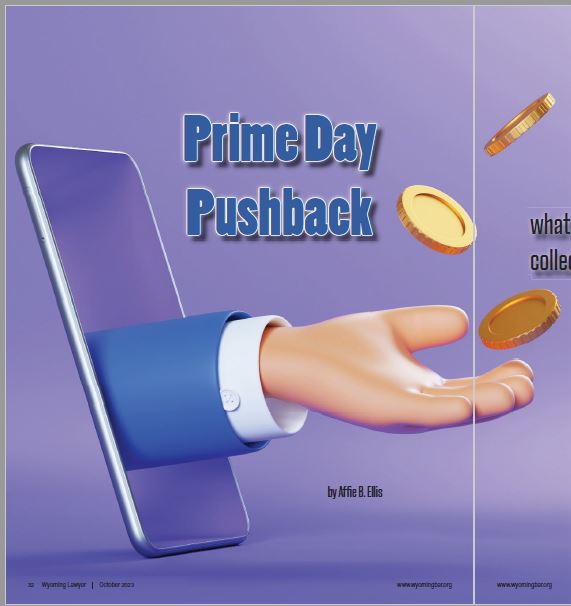Prime Day Pushback: What You Need to Know About Sales Tax Collection on the Reservation
| Citation | Vol. 46 No. 5 Pg. 32 |
| Publication year | 2023 |
| Pages | 32 |

what you need to know about sales tax collection on the reservation
"Let me tell you how it will be - there's one for you, nineteen for me. "˜Cause I'm the taxman, yeah, I'm the taxman." Did you just hear that in George Harrison's voice? "Taxman" is a song from the Beatles' 1966 album, Revolver. Harrison wrote it in protest to a supertax which had the band members paying over 90% of their earnings to the United Kingdom's Treasury.
I listened to "Taxman" the other day and remain astonished that there has not been more resistance to Wyoming impermissibly collecting online sales tax from tribal members living on the Wind River Indian Reservation.
Since the inception of the United States, there have been tensions between states and tribes about the extent to which state law applies on Indian reservations. In the 1830s, Chief Justice John Marshall issued a series of opinions recognizing tribal immunity from state law.[1] He explained that tribes are pre-constitutional sovereign nations operating their own government and state law did not apply within reservation boundaries.[2] However, later Supreme Court decisions and congressional acts eroded these protections, which made room for state law encroachment.[3]
The vast majority of states utilize sales tax for revenue generation. Wyoming imposes a 4% statewide sales tax of which 69% is directed to the state's General Fund and the remainder distributed to counties and municipalities.[4] Wyoming's tax code also provides several exemptions, such as purchases made by entities like non-profit groups or governmental agencies.[5] Vendors must agree to collect and remit the tax.[6] The Wyoming Department of Revenue (DOR) may audit a vendor to ensure compliance; non-compliance can result in fines or even criminal prosecution.[7] Thus, if a purchaser seeks an exemption, DOR requires the purchaser to complete an exemption form.[8]
States started utilizing sales tax during the Great Depression. The issue of whether states could collect sales (and other taxes on cigarettes, income, fuel, etc.) on Indian reservations eventually followed. Courts have generally provided categorical immunity for tribes and tribal members within Indian Country from paying state taxes.[9]
However, non-tribal members do not necessarily enjoy such immunity. If the legal incident of the tax falls on a nontribal member, courts will provide immunity only if the state tax interferes with the tribe's ability to exercise sovereign functions or if federal law preempts taxation.[10] While there are examples of courts invalidating state taxes in Indian Country, courts have also upheld a variety of state taxes, such as state cigarette tax imposed on non-tribal members.[11]Although such activity requires administrative burdens, courts have found such impositions on tribes and vendors to be "minimal."[12]
Academically, this conclusion may seem reasonable. But in reality, such administration is anything but minimal and further, the framework is difficult to enforce. For example, it's not only impractical for vendors on Wyoming's Wind River Reservation to require their Northern Arapaho and Eastern Shoshone customers to complete the state's exemption form for each...
To continue reading
Request your trial
